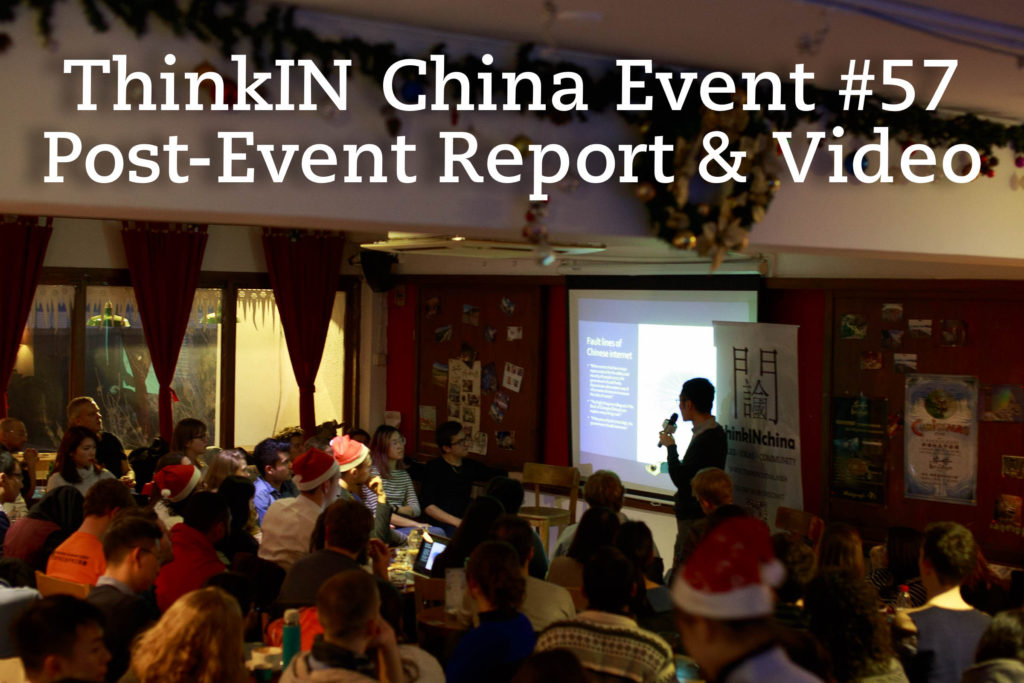

#57 Event Report – Western Populism Through the Prism of Chinese Public Opinion
Speaker
Ma Tianjie 马天杰 writer behind Chublic Opinion — a blog about public opinion with Chinese characteristics.
Post-Event Video
(If this section is blank, make sure you’ve turned on your VPN)
Report
Monday, December 19th, TIC’s community gathered in a festive Bridge Café for the season’s grand finale, followed by a vibrant afterparty accompanied by the jazz notes of Yenchinger Sudarshana Chanda and her band. As Christmas approached and an exciting season came to an end, intellectual enthusiasm and curiosity still animated Wudaokou’s students and researchers. Indeed, 2016 has been a complex (albeit fascinating) year in western politics to observe: Brexit, the election of President Trump, and the rise of populist political movements in Europe have forced us to examine critically and to reflect thoughtfully on the nature of populism. Analyzing these issues within a Chinese context was the topic of our final IN-Talk, which was successfully held at Renmin University. More specifically, we explored how the Chinese public observes and debates changes in the West. TIC was especially thrilled to host Ma Tianjie, whose Chublic Opinion blog provides English-language insights on the complex universe of Chinese social media, online debates, and public opinion’s stirrers and shapers.
The elephant curve: the losers of globalization and Trumps’ victory
Ma is not a self-proclaimed expert of Western populism; he is, however, a passionate researcher who appreciates the importance of understanding how the rise of Weibo, Wechat, Zhihu and other platforms revolutionized information access and political discourse in the Chinese cyberspace. The first question Ma addressed is why well-educated Chinese netizens seem to be fond of Donald Trump. Ma started his presentation by introducing the “elephant curve,” a world-famous graph used to explain the backlash against globalization. The graph depicts which segments of the global population saw a rise in their real incomes from 1988 to 2008: together with the poorest group, white working classes in the Western world happened to be among the biggest “losers” of globalization. These people appreciated Trump for voicing their anger.
But the real question is why winners of globalization like the Chinese middle class, who saw a dramatic rise in their living standards, exulted at the election of a man who harshly attacked China and criticized a system that enabled China to develop?
China’s “political compass” and the rise of opinion leaders
The explanation, for Ma, can be found in China’s value system. The theoretical framework of China’s “political compass,” developed by some students at Peking University, can help situate dominant social values in China, which are reflected by the online community and in public opinion research. PKU’s “political compass” is a tridimensional framework that categorizes political ideologies based on the respondents’ views on state control (politics), traditional values and norms (culture), and the market’s role in resource distribution (economy). Based on the results of the anonymous online self-assessment tool, some political scientists mapped China’s ideological spectrum by looking at patterns in the responses. In the era of big data, this ideological spectrum is amazingly reflected and visualized in graphic representations of clusters and flows of ideas taken from online discussions; this intricate net of posts, comments, and retweets shows how opinions interact, connect, and compete with each other.
With the emergence of social media platforms, opinion leaders have become important shapers of online discussions, posting “articulated but relatively predictable views on a wide range of issues that shape the landscape of ideas.” These pundits rise and fall, so do their ideas: on Weibo, more diverse opinions have recently replaced mainstream liberal, pro-market voices. Ma showed a map of recent trends in Chinese public opinion by tracking dominant debates on the web. In a closely monitored society, social media have become a useful tool to understand what people think.
Key events and debates in the Chinese cyberspace: the refugee crisis and Donald Trump
A single online post and the public’s reactions to it can reveal how the Chinese public sees key events in China and abroad. Ma studied four debates that shook social media: the refugee crisis in Europe, public attitudes toward the poor, the public’s judgment of celebrities committing adultery, and Donald Trump’s election. The first and the last issues stimulated vibrant debate during the Q&A session. A liberal post about Germany’s embracing of Syrian refugees attracted divergent opinions, from humanitarianism to concerns for rising crime rates and cultural clashes in European societies.
These views embody the tension between conflicting values: national stability versus individual welfare, personal achievement versus social support, social homogeneity versus diversity, tolerance, and inclusiveness.
Imaging these pairs as being polar opposites, where does Chinese public opinion lie on the spectrum? Research suggests that the Chinese public prefers conservative values over liberal ones; indeed, this may help explain enthusiasm for Trump in China. Chinese netizens identify Trump as a self-made man (personal achiever) who values stability and homogeneity (reflected in his immigration policy) and traditional family values (as opposed to LGBT rights).
The extent to which these online opinions impact Chinese society as a whole, reflect China’s view of the West, and influence policy makers, merits further research:
Has China become populist, conservative, and/or nationalistic? Or is it simply looking for entertainment?
How does the government respond to online debates? Do these debates impact Sino-US relations? What we can be confident in saying is that today, China watchers cannot neglect the role of social media.
Report by Rebecca Arcesati